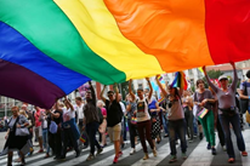|
This piece originally appeared in the DCC-i June 2022 Newsletter.  Pride in Social Work with Trans People? I recently came out as non-binary at work. I’d angsted at trans friends about the decision and tried to ignore the feeling of inauthenticity tickling at the back of my mind for longer than I’d like to admit. Then there was a Government leak stating that trans people would not be included in the ban on so called “conversion therapy”. I realised that the importance of visibility as a trans social worker within mental health services outweighed my discomfort at asking colleagues to change the language they used about me and to maybe consider the existence of gender outside of a binary. So what took me so long? The UK is an increasingly dangerous place to be trans. A 2020 Galop survey found that transphobic hate crime had doubled in the last three years, and that was only hate crime that was reported to police. The survey also found that only one in seven people felt able to report incidents of transphobia. In 2021 the Council of Europe Committee on Equality and Non-Discrimination published a report condemning “the extensive and often virulent attacks on the rights of LGBTI people for several years” in Hungary, Poland, the Russian Federation, Turkey and the United Kingdom (Ben Chikha, 2021:2). The report warned that the rights of trans and non-binary people are being rolled back in the UK leading to human rights issues, and that this is being propagated by politicians and others in positions of power. I’m in a position of privilege and relative power, but I can’t ignore this context. And unlike when being open about other aspects of my identity, I couldn’t be certain of support from my social work community. Are trans rights a social work concern? We are in the midst of a moral panic that seeks to position the rights of trans people, particularly trans women, in opposition to the rights of children and cis women (Pearce et. al, 2020). Transphobic articles published by major UK newspapers and broadcasters portray trans people as sexual predators and pathologise trans people as deluded or mentally ill. A dip into the toxic morass of “Gender Critical” Twitter or a certain online forum for mothers could give the superficial impression that trans rights are a safeguarding issue. Given the current climate of polarised views and misinformation, and that research has demonstrated that social workers do not feel prepared by their training to work with trans people (Stevens, 2022), perhaps the lack of engagement around trans rights from (cis) social workers is understandable. However, trans rights are very much a social work concern. Trans rights are human rights. Promoting human rights and social justice is core to social work. It’s woven throughout our codes of ethics and professional standards. BASW’s 2021 position statement on social work with trans people was a welcome interruption to the social work silence on trans issues. It highlights that opposing the oppression, stigma, discrimination and abuse that trans people face is in keeping with the BASW code of ethics and the social work purpose to uphold human rights (BASW, 2021). Trans people face barriers to all forms of healthcare, have higher levels of self-harm and suicide, are more likely to be unemployed or in low wage jobs and more likely to face homelessness than the general population (Pearce et. al 2020, Galop 2020, McNeil et. al 2012). The 2021 Council of Europe report states that transphobia in the UK breaches Article 14 rights. In 2020 Women and Equalities Minister Liz Truss spoke about reforms to the Gender Recognition Act 2004, mistakenly conflating the provisions of the Act with enabling access to “single sex spaces”, saying that “appropriate checks and measures” need to be in place regarding who accesses these spaces. This poses questions about self-determination and Article 8 rights. Trans rights are your rights. Attempts to challenge or remove rights from trans and non-binary people also impact the rights of cis women, children and other members of the LGBTQ+ community. The main proponents of the “Gender Critical Movement” are predominantly white, middle class, affluent people in positions of power with platforms in the press, universities and parliament. This movement does not represent the interests of working class, racialised and/or minoritised people. The Bell & Anor v. Tavistock & Portman NHS Foundation Trust case briefly (from initial judgement in 2020 until being overturned on appeal in 2021) set a judicial precedent that overrode Gillick Competence with potentially dire consequences for under 16s’ bodily autonomy. Let’s not forget that Gillick v West Norfolk and Wisbech Area Health Authority related to access to contraception. “Gender Critical” arguments against trans rights centre around biological essentialism, stating that women have “sex based rights” that must be protected (see Fair Play For Women, A Woman’s Place UK, etc., ad nauseam). Sex is presented as immutable. “Males” (incorrectly including trans women) are presented as stronger and biologically predisposed to sexual violence. “Females” are presented as fragile, vulnerable and in need of protection, reminiscent of outdated, misogynist notions of the ‘the weaker sex’ (Pearce et. al, 2020). Some “Gender Critical Feminists” go further to define womanhood by the ability to reproduce (e.g. Suzanne Moore in the Guardian, 2019), previously the preserve of anti-choice, fundamentalist religious organisations. Other “Gender Critical” groups state that exposing school children to information about gender and sexual identities (e.g. through the Stonewall School Champions programme) is a safeguarding concern, at times equated to grooming. As someone who attended school under section 28, this is uncomfortably familiar. What can social workers do?
Useful Web Links / Resources
Lizzie Furber (they/them) DCC-i Associate & mental health social worker June 2022 |
AuthorSNews, views and rambling rants from the DCC-i Crew... Archives
September 2022
Categories
All
|
|
DCC Interactive Ltd
Registered Office: 22 St John St, Newport Pagnell. MK16 8HJ Registered in England & Wales, Registration No: 13075266 Contact: [email protected] Registered with the Information Commissioners Officer, Registration No: ZA839281.
|
Our Accreditations: |


 RSS Feed
RSS Feed





